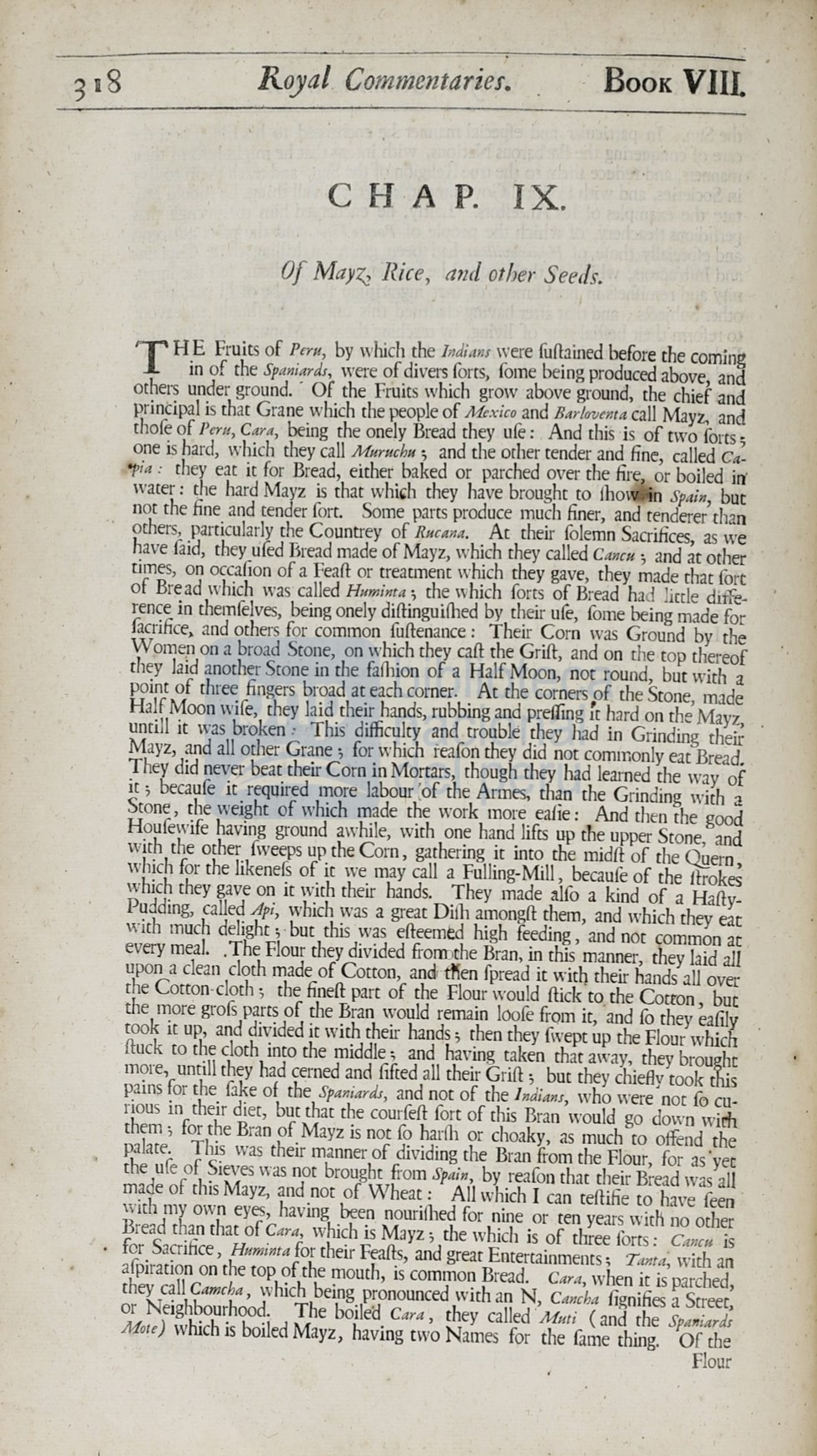

Royal.
Commentaries.
·
BooK·
VIIL
CH A P.
IX.
Of May~
Rice, and other Seeds.
T
HE
Fruits of
Peru,
by which ~he
Jndians
were fu~:Iined before the coming
in of the
Spaniards,
were ofd1vers forts, fome berng produced above, and
others under ground. · Of the Fruits which grow above ground, the chief and
principal is that Grane which the people of
M exico
and
Bar!uventa
call Mayz, and
chofe of
Peru, Cara,
being the onely Bread they ufe: And this ·is of two forts;
one is hard, which they cal!
Muruchu
;
and the orher tender and fine, called
Ca–
-pia :
they eat it for Bread, either baked or parched over the fire, or boiled in·
water: the hard Mayz is rhat whid1 chey have brought to ího
·n
Spain,
but
not che fine and tender fort.
Some pares produce much finer, and tenderer than
ochers, particularly che Countrey of
Rucana.
Ac their folemn Sacrifices, as we
have faid, they ri[ed Bread made of Mayz, wbich chey called
Cancu
;
and at other
times, on occafion of a Feaíl: or treacmenc which chey gave, chey made that fort
of Bread which was·called
Huminta ;
che which
fom
of Bread had lict!e di.ffe–
rence in themfelves, being onely diíl:ingui01ed by cl'.eir ufe, fome being made for
facrifice> and ochers for common fuíl:enance : Their Coro was Ground by the
Women on a broad Srone, on which they caíl: the Griíl:, and on che top chereof
. rhey la1d anocher Srone in the fafhion of a Half Moon, nor round, bue with
a
point of chree fingers broad at each comer. At the corners of the Stone, made
Half Moon wife, they laio rheir hands, rubbing and prelling
!e
hard on theMayz,
uncill it was broken .-
This difficulcy and trouble rhey had in Grinding cheir
Mayz, and all other Grane ; for which feafon chey did not comrnonly eac Bread.
They did never beac cheir Corn in Morcars, chough rhey had learned che way of
ic; becaufe ic reqqired more labour '.of che Armes, d1~n che Grinding with
a
Scone, che weighc of which made che work more ealte : And chen che good
Houfewife having ground awhile, wich one hand
lifcs
up che upper Scone, and
wich che ocher faeeps up che Corn , gachering ic inco che midíl: of che Qgern,
which for che likenefs of ic we may cal!
a
Fulling-Mill, becaufe of che ihokes
which chey gave on it wich cheir hands. They made alfo a kind of a Haíl:y–
Pudding, called
Api,
which was a great Difh amongíl: chem, and which chey eac
wich mucli delight ;·but chis was eíl:eemed high feeding, and not common ac
every mea!.
.The Flour chey divided frormohe Bran, in chis manner, they laid ali
upon a clean cloch made of Cotton, andr·-d'ien fpread ic wich cheir hands
all
over
rhe Cocton-cloch ; che fineíl: part of che Flour would íl:ick to che Cocton, bue
the more grofs parrs of the Bran would remain loofe from ic, and fo they eafily
rook ic up, and divided ic with cheir hands; rhen they fwepc up the Flour which
íl:uck
co
che cloch into che middle ; and having taken thacaway, they brought
more, umill chey had cerned and fifced al! rheir Grift ; but chey chiefly cook chis
pains for che fake of tbe
Spaniards,
and not of the
lndians,
who were noc
fo
cu–
rious in their diec,
bue
thac che cour[eíl: fort of chis Bran would go clown wirh
thern; for the Bran of Mayz is noc
fo
harfh or choaky, as much
co
offend the
palare. This was their manner of dividing the Bran from che Flour, for as ·yec
the uíe of Sieves was noc broughc from
Spain,
by reafon rhac cheir Bread was all
made of chis Mayz, and noc of Wheat: Ali which
I
can cefüfie to have feen ·
wich my own eyes, having been nourifhed for nine or ten years wirh no orher
Bread chan thac of
Cara,
which is Mayz; che which is of chree forcs:
Cancu
is
for Sacrifice,
Huminta
for cheir Feaíl:s, and greac Entercainrnents;
Tanta;
with an
afpiration on che top of.che mouch, is comrnon Bread.
Cara,
when ir isparched,
they cal!
Camcha,
which being pronounced wich an N,
C,,mcha
fignifies a Streer,
or Neighbourhood.
The boilea
Cara ,
rhey called ·
Muti
(
and rhe
Spaniardí
Mote)
which is boiled Mayz, having two Names for the fame thing. Of che
Flour














